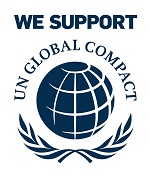United Nations Global Compact
Fujitsu announced its support of the United Nations Global Compact in December 2009. The Fujitsu Group is committed to global sustainability Activities that uphold the 10 principles of the Global Compact. Through this commitment, we will meet the demands of various stakeholders in international society, and uphold responsible management as a true global ICT company contributing to the creation of a sustainable society.
What is the Global Compact?
<The 10 principles of the UN Global Compact>
The UN Global Compact consists of 10 principles in the four areas of human rights, labor, the environment, and anti-corruption with which companies should rigorously comply.

- Human Rights
Principle 1: Businesses should support and respect the protection of internationally proclaimed human rights; and
Principle 2: make sure that they are not complicit in human rights abuses. - Labor
Principle 3: Businesses should uphold the freedom of association and the effective recognition of the right to collective bargaining;
Principle 4: the elimination of all forms of forced and compulsory labor;
Principle 5: the effective abolition of child labor; and
Principle 6: the elimination of discrimination in respect of employment and occupation. - Environment
Principle 7: Businesses should support a precautionary approach to environmental challenges;
Principle 8: undertake initiatives to promote greater environmental responsibility; and
Principle 9: encourage the development and diffusion of environmentally friendly technologies. - Anti-Corruption
Principle 10: Businesses should work against corruption in all its forms, including extortion and bribery.
Please refer to the "GRI Standard/UN Global Compact (GC) Index" for the relationship between our sustainability activities and the United Nations Global Compact, as described in the "Sustainability" sites and "Fujitsu Group Sustainability Data Book".
- *We have been reporting our COP (Communication on Progress) at the Advanced Level since FY 2012.


